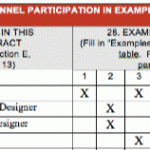
When it comes to proposals, nobody talks about this. What game are you playing?
We could live our life believing that every procurement is the same. Every time we submit a proposal, we are playing our hand in the same game.
But that’s delusional. Every procurement is different. That means every time you submit a proposal, you’re playing a different game.
What Game Are We Playing?
Would you compete professionally in a sport without knowing the rules of the game or who you’ll be competing against? I hope not.
Yet, too many people developing proposals will start working without even considering the game they are playing. And quite frankly, that’s “coo coo for coco puffs.”
To understand the game, we must be able to identify the Institutional, relationship, competitive, political, and selection differences between each procurement.
Let me explain what I mean.
Institutional Differences
Each client has a different history procuring your services. Therefore, they’ve likely developed a different set of rules and procedures for hiring firms like yours.
Each client has their own Motis Operandi (MO). That means the circumstances as to why they want your services, what brought them to that conclusion, are different.
A township library board soliciting proposals has a completely different MO than a large pharmaceutical company…even if they’re both requesting the same service.
Each client has their own habits. This includes preferences regarding who they like to work with and how price plays into their selection.
One healthcare system head of architecture told me how they keep giving one firm contracts despite the fact their proposal are the worst. They like working with this firm.
Relationship Differences
I hate to use the word relationship because people put far too much weight on this concept. And it can be an extremely vague concept.
But the fact is, this client may have worked with you before. And that may or may not have been a good experience. Further, they may have worked with your competitors and had good or bad results.
You may be competing against your client’s cousin and it’s already decided that he or she will win the contract (that actually happened to me).
The degree to which these relationships do or don’t exist can play a major role in defining the game you are playing.
Competitive Differences
Most likely, you’re not going to compete with the same firms in every procurement. A different competitive makeup may require different strategy.
For example, if you are the only small firm competing against big firms, you might try to leverage that difference. But if the next procurement has you competing against similar small firms, that difference no longer exists.
Political Differences
Clients may have different political pressures placed on them.
For example, I was moderating a discussion where a representative from Oklahoma City admitted that they give preferential treatment to local firms. I asked if this was stated in RFPs or whether out of state firms had to figure this out themselves. He responded that they have to figure it out themselves.
That’s a mild example of political pressure.
Here’s a more extreme example. Sometimes clients make a selection. But that selection has to be “rubber stamped” by a political appointee. That political appointee may decide that another firm “deserves” the contract, stealing it away from the rightful winner.
Selection Differences
What I mean by selection differences is that how you are scored and who is scoring you might be different with each proposal. And you have to consider these factors.
For example, if 20% of the score is based on the price…that’s a different game than when it’s purely a qualifications-based selection. And if it’s a lowest price technically acceptable procurement, that’s a completely different game.
If the selection committee is made up of people who have no clue about the service they’re buying, you need to approach strategy differently than if it was made up of sophisticated technical people.
The Bottom Line
You can’t just walk into a procurement blindly. You’ve got to consider the game you are playing and adjust your strategy accordingly.
The next time you work on a proposal, ask this question: what game are we playing?
What are the institutional, relationship, competitive, political, and selection differences this time around?
Now It’s Your Turn
When submitting a proposal, do you consider the game being played? If you don’t, what factors determine your strategy?
Share your experiences in the comments.





And when an agency says that you should propose, consider whether they have already wired the competition for someone else. If the word is on the street, they might be unable to award because they won’t have enough competitive proposals to qualify as having a fair and open competitive RFP. This is more common when the proposals are very expensive ($200k and up) and agencies think you have money to burn on a loser proposal.
A very good point.
Great topic! But two things:
It’s “cocoa” not “coco.” And it’s “modus operandi” not “motis operandi.”
Thank you for the clarifications. 🙂
Well stated Matt. And it goes even deeper. We have a “state-wide” client that operates under a single set of published procedures and “General Requirements” for consultant procurement. Yet, the Department is split into multiple entities that serve specific geographies and operational concerns. Each, though working within the context of the state-wide directives, has its own “interpretation and expectations.” Political forces vary according to the elected officials of influence. Expected qualifications of key personnel are dependent on the entity and sometimes even the project manager him/herself. And so it goes. None of these variables are on record. The only way to learn what wins is to dip your toes in the water and continually seek answers that allow you to bring the temperature to a level that’s to EVERYBODY’S liking.
Ed,
Thank you for contributing to the discussion. Good points.
Thanks for the article Matt. I am glad to see it illustrated why I insist on a proposal kick-off meeting to consider all of these things and initiate this discussion as part of planning our proposal. Otherwise I have a team of engineers running around not knowing what the big picture is, or the end-goal is, and that really does reflect in the final product.